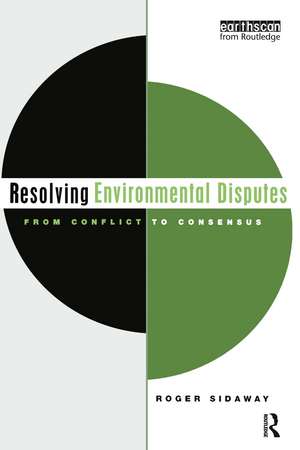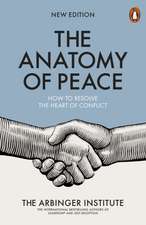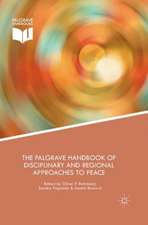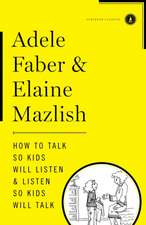Resolving Environmental Disputes: From Conflict to Consensus
Autor Roger Sidawayen Limba Engleză Paperback – apr 2005
Preț: 302.38 lei
Preț vechi: 342.99 lei
-12% Nou
Puncte Express: 454
Preț estimativ în valută:
57.87€ • 60.05$ • 48.37£
57.87€ • 60.05$ • 48.37£
Carte tipărită la comandă
Livrare economică 17-31 martie
Preluare comenzi: 021 569.72.76
Specificații
ISBN-13: 9781844070138
ISBN-10: 1844070131
Pagini: 320
Dimensiuni: 156 x 234 x 18 mm
Greutate: 0.59 kg
Ediția:1
Editura: Taylor & Francis
Colecția Routledge
Locul publicării:Oxford, United Kingdom
ISBN-10: 1844070131
Pagini: 320
Dimensiuni: 156 x 234 x 18 mm
Greutate: 0.59 kg
Ediția:1
Editura: Taylor & Francis
Colecția Routledge
Locul publicării:Oxford, United Kingdom
Cuprins
Introduction * PART I: UNDERSTANDING ENVIRONMENTAL DISPUTES * Introduction to the Principal Case Studies * Access to the Countryside in England and Wales * The Designation of the Pentland Hills Regional Park * Using Social Theory to Explain Conflicts * Conflict Analysis * A Dynamic Analysis of the Designation of the Pentland Hills Regional Park * A Dynamic Analysis of Moorland Access in the Peak District National Park * PART II: STRATEGIES FOR COOPERATION * Alternative Dispute Resolution � The Contribution of Negotiation and Consensus Building * Ways of Resolving Disputes * Consensus Building * Assessing Participation in Decision-making * Mediation and Its Contribution to Resolving Environmental Disputes * The Process of Mediation * Pre-negotiation Discussions � The Importance of Thorough Preparation * The Negotiation and Post-negotiation Stages * Critiques of Mediation * The Mediators' Response � Conflict Assessment and Process Design * Applications of Environmental Mediation * Cultural Variations * Case Study: Access Management by Local Consensus � Mediated Negotiations in the Peak District * 'Clearing the Air' � The North Oxford County Coalition * Pre-negotiation Stage * Negotiation Stage * Strengths and Weaknesses of the NOCC Process * Turning Points in the Debate * Achievements and Outcomes of the NOCC * The Value of Outside Intervention * Public Participation in Decision-making and Partnerships * Participation � Opportunity or Problem? * The Case for Participation * Definitions of Participation and the Values They Espouse * Tokenism and the Exercise of Power * The Distinction between Consultation and Public Involvement * Communities and Partnerships * Process Design * Principles of Participation * Building Trust � Crucial Lessons in Participation and Partnership * Case Studies * PART III: THE REALITIES OF POWER * Organizations, Power and Conflict * Power and Conflict * Case Study 1: The Designation of the Skomer Marine Nature Reserve * Case Study 2: Planning in the Rhine Delta * Consensus and the Political Process * Understanding Political Processes * Case Study 1: Striving for Sustainability in the Northern Maine Woods * Case Study 2: Countryside Access in Scotland � The Work of the Scottish Access Forum * PART IV: THE CASE FOR REFORM * Conclusions on Removing the Barriers * How and Why Environmental Conflicts Occur * The Role of Conflicts in the Political Process * Using Consensus Building to Prevent or Resolve Conflict * Removing the Barriers: The Wider Application of Environmental Consensus Building in Scotland * Opportunities for Institutional Reform * Final Reflections *
Notă biografică
Roger Sidaway is an independent researcher and mediator who teaches and leads training courses at the University of Edinburgh.
Recenzii
'Thought provoking, important and instructive, this is a masterly guide to dealing with environmental conflicts'Professor Des Thompson, Scottish Natural Heritage'This is a long awaited book. Many of us in the environmental policy, management and decision-making business have been struggling along to make environmental values and developmental values fit. This book helps us to have a better means for finding the shared values and actions that most environmental issues entail. It has the heft of sound scholarship and the street sense of someone who has actually been there and done that'William R. Burch, Jr., Hixon Professor of Natural Resource Management, Faculty Director, Yale Urban Resources Initiative'One of Roger Sidaway's greatest strengths is that he is fully knowledgeable of both the participatory and consensus-oriented approaches, and he treats them both as part of the same enterprise of finding solutions to community problems through dialogue and mutual problem solving'James L. Creighton, Author, The Public Participation Manual, Founding President, international Association for Public Participation












